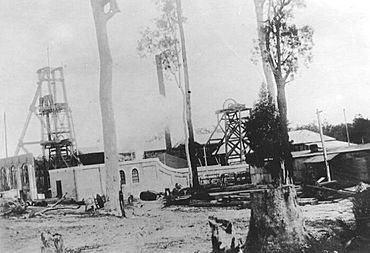Kitchener, New South Wales facts for kids
Quick facts for kids KitchenerCity of Cessnock, New South Wales |
|||||||||||||||
|---|---|---|---|---|---|---|---|---|---|---|---|---|---|---|---|

Photograph of the Aberdare Central Colliery, Kitchener
|
|||||||||||||||
| Population | 530 (2011 census) | ||||||||||||||
| Postcode(s) | 2325 | ||||||||||||||
| LGA(s) | City of Cessnock | ||||||||||||||
| State electorate(s) | Cessnock | ||||||||||||||
| Federal Division(s) | Hunter | ||||||||||||||
|
|||||||||||||||
Kitchener is a small town in the Hunter Region of New South Wales, Australia. It's part of the City of Cessnock.
You can find Kitchener about 5 kilometers south of the town of Cessnock. It's also right next to Werakata National Park and the Aberdare State Forest. The town got its name from Lord Kitchener. He was a famous British leader during World War I.
Contents
Exploring Kitchener's Mining History
Kitchener has a rich history linked to coal mining. It was once home to the Aberdare Central Colliery, which is a coal mine. This mine was built by a company called Caledonian Collieries Ltd during World War I.
The Aberdare Central Mine
The old mine site has been saved as a special Heritage Park. You can still see the poppet head structure there. A poppet head is a tall frame built over a mine shaft, used to lift things in and out of the mine. Many of the houses in Kitchener were first built for the people who managed the mine.
In 1914, the Aberdare Central mine employed 93 people. Just four years later, in 1918, that number grew to 287 workers.
Mine Operations and Closure
In July 1943, a big fire happened at the mine. This fire caused the mine to close down for a whole year. The Aberdare Central mine finally closed for good in November 1961. Even though it's closed, the company Coal & Allied still owns the rights to the coal in that area.
New Mining Activity in Kitchener
More recently, in 2009, a Chinese mining company called Austar got permission to build a new facility south of Kitchener. This new site helps them with their mining operations. They use a special method called Longwall Top Coal Caving to get coal from the Greta Coal Seam. This mine was previously known as the Southland Coal Mine.
 | Roy Wilkins |
 | John Lewis |
 | Linda Carol Brown |

